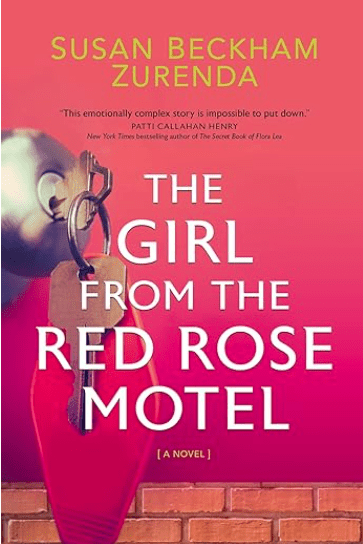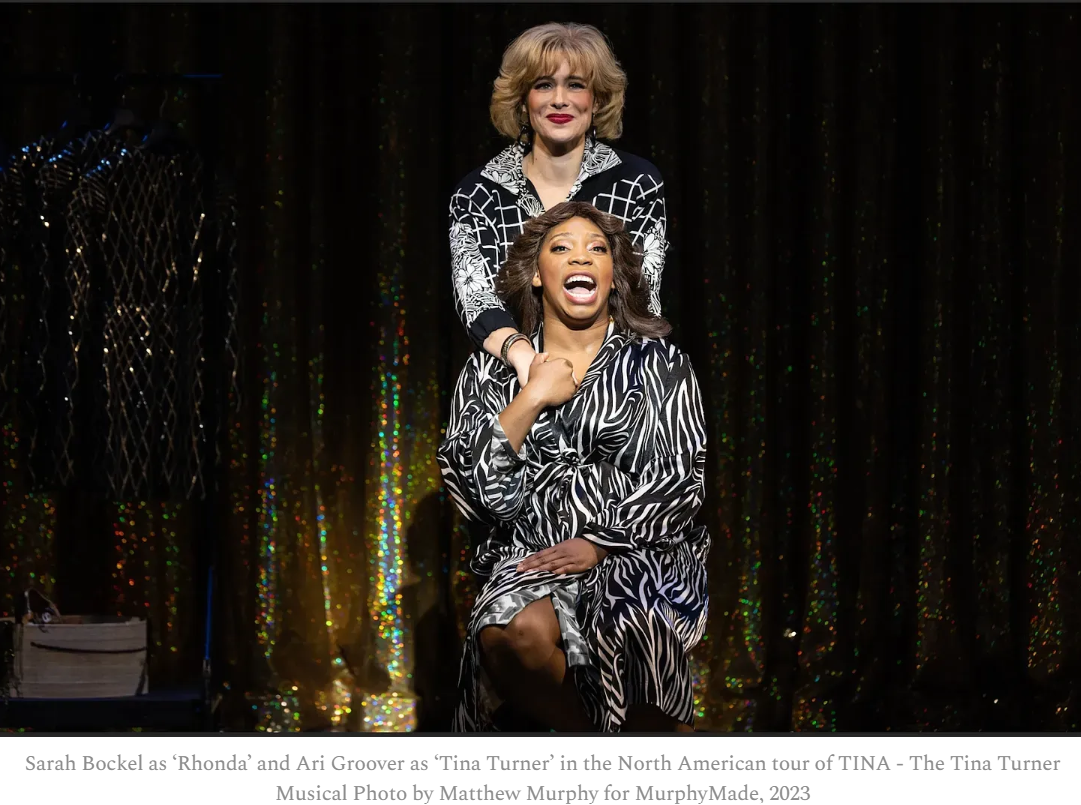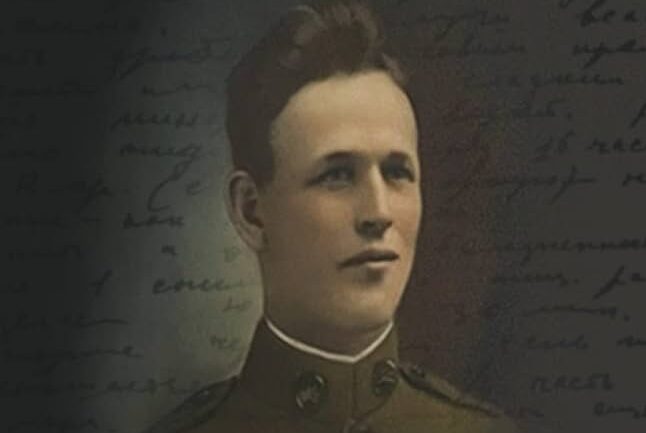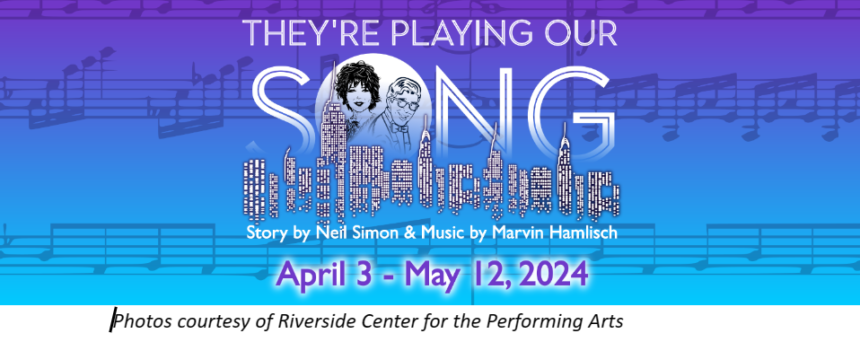
‘They’re Playing Our Song’ is a bridge in Neil Simon’s career, and a delight for today’s audiences.
by Marvin Hamlisch and Carol Bayer Sager, with book by Neil Simon
Presented by Riverside Center for the Performing Arts (Plays through May 12, 2024)
On Saturday night, I had the opportunity to visit an old acquaintance.

They’re Playing Our Song was first done on Broadway in 1979, when Hamlisch and Bayer Sager were riding high on the pop charts, Hamlisch had penned the score for the mega-hit A Chorus Line, and they had embarked on a long-term love affair that serves as the backbone for the show. Simon was already a commercial theater legend at this time whose playwriting style had already gone through a new phase of emotional discovery.
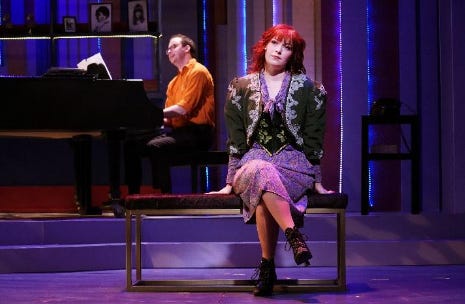
The play concerns Vernon and Sonia: he is an established hit-maker with a style that bridges many different musical styles; otherwise he’s the kind of guy who comes off as smart and smart-mouthed but pleasant. His reserve masks a vast awkward uncertainty so well that you’d never know what he’s hiding. You really want to like him, but like Sonia you just can’t seem to break through. Sonia faces uncertainty with an intense kookiness that gives itself to wisecracks and comments. Her inner monologue is right there on the outside, and she uses unexpected direct honesty as a means to put others on their guard, which is what she does to Vernon.
Will these two ever get together? It being basically a romantic comedy, we know they will. However, it being the late seventies, them getting and staying together are two separate issues. And of course, because it’s the late seventies our couple’s therapists share the same building, which happens to be where Vernon lives. This may seem incidental to a love story.
I assure you, if these two weren’t completely aware of their personal failings and complexities they’d have few other problems, but they’d probably never get together. Imagine if a successful adult mix of Charlie Brown and Schroeder (from Peanuts) were to meet up with an up-and-coming but vulnerable adult Peppermint Patty in New York. That’s where they start off.
They also find each other’s music and lyrics to be sublime. They also desperately need each other’s good opinion. The artistic collaboration is instant and believable. The relationship starts off professional but moves with precision and swiftness to the personal. Then to the sexual. They are two performers who can’t stop performing for each other.
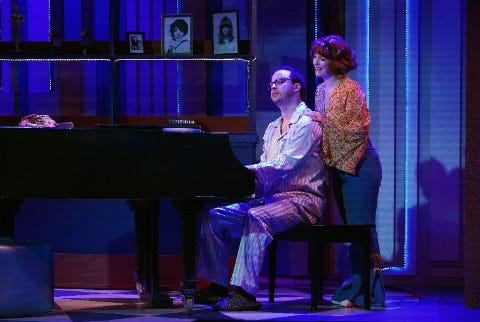
The staging is seamless and easy. That, plus there are only two characters. Um, okay, that is two characters played by eight actors (each of our leads has “backup vocals” that accompany them through the songs). They are called The Voices, and they also provide necessary background characters and chorus members.
The style is breezy and fun and ironic and slightly twisted.
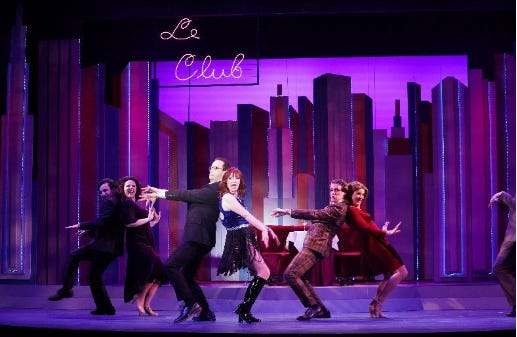
The action takes place in a flexible stage set where projections (New York! A country road! LA!) and an almost magically swift set of costume changes allow an instant change of background. In this formula you just add furniture, and the scene is set.
The production allows the costumes to tell who the characters are and when and where we’re seeing them. Sonia and her Voices dress in costumes left over from plays, everything Russian realists to Pippin. She’s a writer, a poet, and a born performer. However, in the later scenes she owns her own style, stops costuming herself, and starts dressing her own personality.
You’ll find yourself enjoying the banter, which carries on into the songs which flow from the scenes. It helps tremendously that these two express themselves in song both because that’s their business and their most natural way to communicate with each other. They use their songs to express love and support but also to hurt and betray.
Neil Simon helped to define modern American comedy. By this point in his career he was not only an accomplished playwright in his own right, he had earned the nickname “Doc” because he was the go-to guy who could doctor comic moments and lines for anyone else’s script. In the mid-seventies a series of personal issues caused a sudden maturity and emotional depth to his writing. They’re Playing Our Song is at a bridge moment for Simon’s two styles: Vernon and Sonia’s story is told with intensity and honesty. Some of the laughs, however, seem forced. Maybe Sonia’s kookiness in the opening scenes seems to be kookiness for the sake of a laugh, or a side comment doesn’t ring true. These don’t happen often, but occasionally I found myself laughing because I felt like I should laugh, and then wondering why. Did “Doc” do a lot of doctoring on his own script?
Did this stop me from enjoying Riverside’s production moment by moment? In no way.
I really enjoyed Riverside’s production along with the rest of the audience. The music is an enjoyable blend of pop styles, ranging from the exuberant “They’re Playing Our Song” to the soulful “Falling” to the tragic “If You Remember Me.” The voices are strong and true.
The orchestra, as always, is magnificent and balances well with the voices. This is also a compliment to the sound crew at Riverside. You are always in the hands of professionals when hearing a show there.
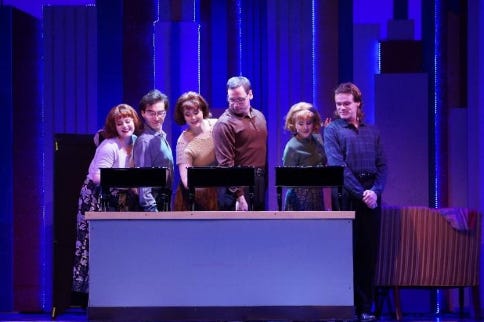
The performers are well suited to the roles. Carson Eubank (who is usually the Music Supervisor for Riverside) shows himself an able performer as Vernon, and Ashlee Waldbauer’s Sonia is alternatively manic and soulful.
Sonia’s Voices, played by Barbara Breen, Jessica Barraclough, and Megan Hasse are an enthusiastic girl group while Kevin Cleary, Christopher Florio, and Michael Goltry really seem to be enjoying themselves as Vernon’s Voices.
Riverside adds another strong nostalgic performance to this years’ season. You really should go!
Dennis Wemm is a retired professor of theatre and communication, having taught and led both departments at Glenville State College for 34 years. In his off time, he was president and sometimes Executive Director of the West Virginia Theatre Conference, secretary and president of the Southeastern Theatre Conference, and generally enjoyed a life in theatre.


